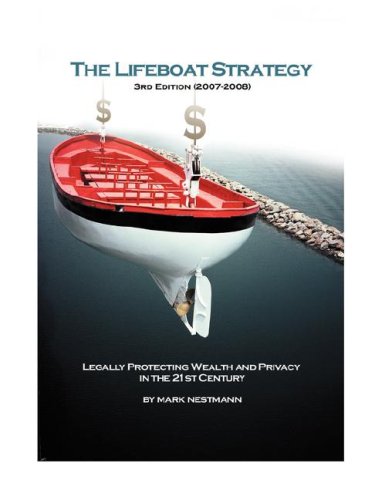Recently by Mark Nestmann: Another IRS Offshore ‘Amnesty’ Program Coming?
The Internet is everywhere. It’s not just on your laptop anymore…nearly 1 billion consumers worldwide now carry Internet-connected smartphones. That means “malware” spread over the Internet – viruses that steal your data, pfishing scams that trick you into giving a thief access to passwords – and other threats will only get worse as 2011 proceeds.
How can you protect yourself? Here are a few thoughts:
 One Nation, Under Surv...
Best Price: $3.80
(as of 06:20 UTC - Details)
One Nation, Under Surv...
Best Price: $3.80
(as of 06:20 UTC - Details)
Your mobile phone. Research in Motion – the company that manufactures the Blackberry phone line – is much more security conscious than either Apple (which sells the iPhone) or Google (the company whose software powers the Android). It’s simply more difficult for a casual hacker to steal your data on a Blackberry than an iPhone or Droid.
But it’s hardly impossible. You open yourself up to attack by using applications featuring mobile banking or other payment services. The most secure mobile payment platforms force you to enter in a supplemental password or take additional steps to verify your identity before making a transaction. Insist on secure applications, or carry out your transactions the-old fashioned way – by check or with a phone call you originate.
 The Lifeboat Strategy
Best Price: $45.58
Buy New $145.95
(as of 09:40 UTC - Details)
The Lifeboat Strategy
Best Price: $45.58
Buy New $145.95
(as of 09:40 UTC - Details)
Your social networks. Nearly 1 billion people now log on regularly to social networks like Facebook and Twitter. Attacks and malware aimed at social networks occur almost daily. Remember, the more information you post about yourself, the easier it is for an attacker to impersonate you and steal your identity – or pretend to be a “friend” and try to convince you to reveal information you’d prefer to keep confidential.
Your “cloud.” As computer applications become more complex, not to mention costly, growing numbers of consumers have opted to use online services for word processing, e-mail, and data backup. These services are convenient and cost-effective – but again, security is a big question mark. Security researchers at ISCA Labs predict: “Cloud services will become prime targets for hackers wanting to gain access, not just to a specific company’s data but possibly to multiple victims simultaneously.” If you use these services, just make sure that you keep data encrypted as much as possible and keep backup data on your own PCs. If the cloud “crashes,” as it were, at least you’ll still have access to your data.
Your friends. Lots of smartphone users think it’s cool to use location-based services on their phone so their friends can track their location at all times. These applications also serve up special offers for discounts or other deals from merchants participating in the network. However, it’s relatively easy for criminals to cash in as well by sending you a persuasive message from one of your “friends” to convince you to visit a poisoned Web site or release personal data. So be careful!
Oh yes. Even if you’re not an “early adopter” of these technologies, your children or grandchildren probably are. Warn them of the threats these technologies pose. They may dismiss your concerns as unfounded or even old-fashioned, but they may not, especially if they or their friends have suffered lost data, had a bank account compromised, or were merely locked out of an account.
Reprinted with permission from The Sovereign Society.
January 10, 2011





